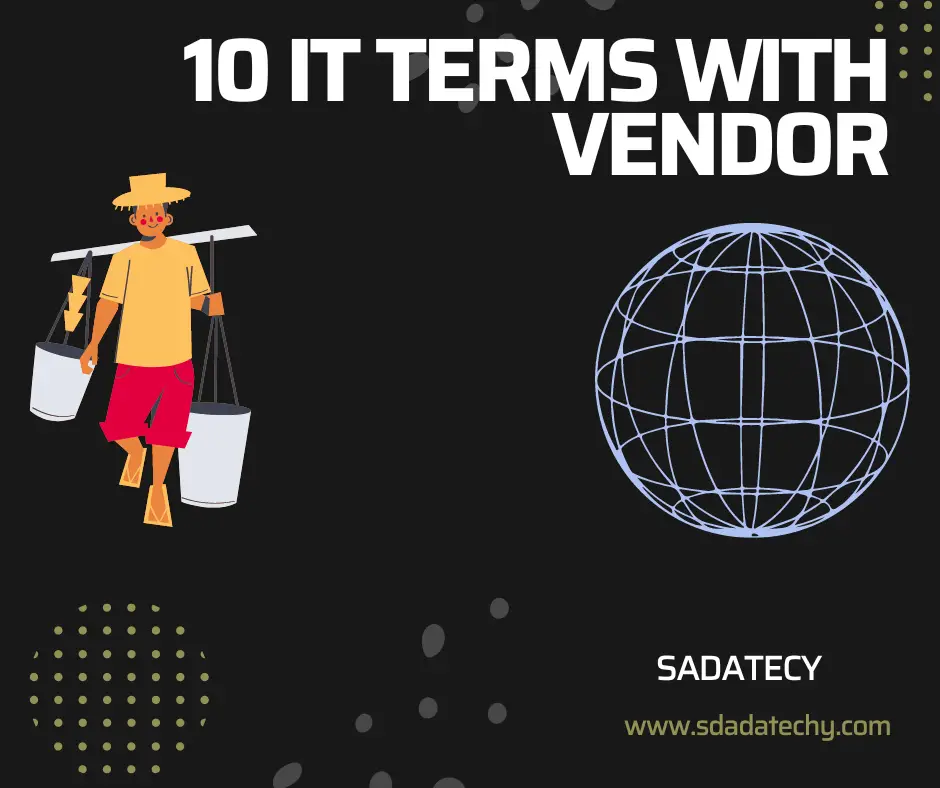Define a merchant.
A vendor is a person or company that acts as a retailer or wholesaler.
A common phrase in the information technology sector may apply to suppliers of both physical goods (like computers and networking gear) and intangibles (such programs and applications). Also called a “vendor” for short.
Although the term’s association with the IT sector is significant, it is equally used in other fields.
source of supply
The seller has British ancestry.
The word “vendor” refers to a person who engages in the business of selling or trading goods and services. The katakana equivalent of the word “vendor” is employed in a manner that’s quite similar to the English use.
Companies that provide goods or services are commonly referred to as “vendors,” a phrase that may also refer to wholesalers or suppliers.
So, what exactly does “vendor” imply in the world of information technology?
The term “vendor” generally refers to a corporation engaged in sales, but in the IT sector, it is often used to refer to businesses that provide both goods and services.
There is often no clear delineation between vendors and manufacturers in the IT business due to the common practice of consolidation of production and sales functions within a single organization. The term “vendor” may refer either to the business that makes purchases in the manufacturing sector or to the manufacturing industry as a whole.
The term “vendor” may also be used to describe a vending machine.
In contrast to the English term, the Japanese term for a vending machine is simply “vendor.”
A “vendor” or “vendor company” is a business that owns and services a vending machine.
Vending machines that can still dispense goods in the case of a power loss often sport a “Disaster Relief Vendor” label these days.
Here are ten vendor-related IT terminology
In the information technology field, the term “vendor” often appears in phrases with other words, expanding its meaning.
The terms “Single Vendor,” “Multiple Vendors,” “Vendor Code,” “Vendor Control,” “Vendor Lock-In,” “Development Vendor,” “Information Technology Vendor,” “Vendor Qualification,” “Vendor Prefix,” and “Vendor Registration” will all be defined and explained in detail below.
Information technology vendor jargon number one: a “single vendor”
In the information technology field, “single vendor” might signify one of two different things.
To use components from the same manufacturer (vendor) in a single system is the first meaning. Using well-defined hardware and software gives benefits in terms of compatibility and ease of assembly.
And in a second sense, it might refer to a business that offers just one particular brand.
Second vendor-related IT term: multi-vendor
Single-vendor systems are the antithesis of multi-vendor systems.
It has two meanings, similar to “single seller.” The first sense is to construct a system employing components from different manufacturers (manufacturers).
Numerous product choices are available with multi-vendor, and when used in concert, they may provide a cost-effective, highly-functional system.
The term may also refer to the business models used by retailers that stock goods from more than one manufacturer.
Thirdly, the jargon of the vendor’s IT department: vendor code
When purchasing from a certain vendor, you’ll need to know the product’s vendor code.
PCI Express network cards and routers, for example, each have what is called MAC addresses, which are unique identifiers for their respective types of IT hardware.
Although MAC addresses are 48 bits in length, the first three are uniquely associated with each manufacturer. In this section, you will be able to locate the maker.
A Glossary of Vendor IT Jargon Number Four: Vendor Management
In system development, vendor control is responsible for keeping in touch with suppliers and marketing projects, as well as coordinating engineers and overseeing the work of each supplier.
When working on a project with several suppliers, it is sometimes necessary for the in-house SE to act as a go-between for the many parties involved, such as ensuring that the user company’s needs are appropriately conveyed to the vendor. increases in significance.
Vendor lock-in is the fifth IT vendor phrase.
When a system is “locked in” to a single supplier, it prevents the integration of any competing goods.
If you see it as encompassing users, it becomes clearer.
When designing a system, it’s challenging to convert to a different vendor after having adopted the unique technology and products of a single vendor.
We refer to these circumstances as “locking in” a vendor.
Sixth vendor IT term: vendor development
A development vendor is a corporation that does more than just sell and distribute IT goods; it also creates new products and manages their introduction, marketing, and distribution.
When compared to other sectors, IT might be confusing since so many organizations offer items they have designed and built themselves. In this context, the term “development vendor” connotes that the business in question does more than only sell; rather, it also creates new products.
Definition 7 – IT Vendor
A corporation that provides goods and services in the IT industry is known as an IT vendor.
Hardware, systems, software, and services are all considered IT goods, but the organizations that provide them are referred to together as IT suppliers.
The vendors are further subdivided into subcategories based on the goods and services they sell, such as PC sellers, ISPs, and cloud service providers.
Prominent provider of computer technology
Fujitsu is well-known for producing and marketing a wide variety of electronic components in addition to PCs and mobile devices.
We also produce central processing units for supercomputers, and our share of the Japanese market is very consistent.
NTT DATA is a well-known provider of IT services, especially in the areas of system development for banks and government organizations.
It’s fair to say that IBM Japan, NEC, Hitachi, etc., are all rather typical Japanese IT companies.
Technology-related Term #8: Vendor Certification
Each vendor has its own set of requirements known as “vendor qualifications.” Qualifications are awarded to people who demonstrate sufficient expertise with the company’s goods via testing, allowing for more responsible use and management. expected to be
Microsoft Certified Professionals and Apple’s Certification Program are both household names. It seems that many individuals want to get such certificates as a means of demonstrating their technological expertise.
Information Technology, Number Nine: The Vendor Prefix
Each browser can render CSS consistently with the help of a vendor prefix (a program that determines the layout and design of a site).
Just like its English counterpart, “prefix” has no other meaning in the language.
It’s possible that certain CSS attributes won’t work in your browser until you add the vendor prefix, but doing so will ensure that the relevant screen is shown.
Technical jargon number ten for vendors in the IT world: vendor registration
Small and medium-sized businesses may benefit greatly from adopting IT systems, but doing so on your own is a significant challenge due to the high bar that must be cleared in terms of both knowledge and processes.
Vendor registration is a method that helps offset this by providing financial incentives to small and medium-sized businesses that use new forms of information technology.
By becoming registered vendors, businesses are granted access to subsidy programs for the sale of IT products. In other words, it’s a network whereby officially recognized providers lend assistance to smaller businesses.
Three adjectives that are often used to describe suppliers
What exactly separates a manufacturer from a supplier, given that the original definition of vendor referred to a distributor?
We’ll define the opposite of “user” in the context of IT companies.
Supplier Noun 1: maker
The difference between vendors acting as distributors and manufacturers acting as manufacturers is very obvious.
It’s natural to see a distinct separation between production and retail in the consumer electronics business. It’s often accepted that anybody who “makes” anything is “manufacturing” it.
Many businesses in the IT sector engage in both manufacturing and sales, which may explain why these two terms are frequently used interchangeably.
User Term 2: Related to Vendor
The opposite of “vendor” is “user,” and the “user” is the customer who puts the goods sold and distributed by the vendor to good use.
Users are often referred to as “end users.” To those in the field of information technology, the term “authorized user” may also refer to a specific individual or a set of credentials that denotes that individual’s level of access.
Term 3: Supplier relates to vendors.
A provider is a provider.
The English word for “supply” is “supply,” and the word for “supplier” is “a person who provides.”
It is common practice for a supplier to buy a manufacturer’s wares, with the items subsequently flowing to a vendor for final distribution. However, in the IT business, the phrases manufacturer, supplier, and vendor are often used practically interchangeably, even though the distinction between them is evident in other sectors where this tendency is more pronounced.
A vendor is only a distributor by another name.
A distributor is essentially what is meant by the phrase “vendor.”
Companies termed manufacturers and suppliers might be somewhat different from one another depending on the business; nevertheless, in the IT sector, the three phrases are typically used interchangeably.
Many other IT-related terminologies refer to vendors, therefore it’s safe to say that individuals who work in the field will be acquainted with the term.
For more details catch us on Facebook


